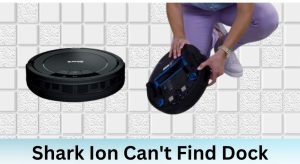Shark robot vacuums are designed to make cleaning effortless, but even the most reliable devices can encounter issues. One of the most common problems users face is the robot not picking up debris effectively. This issue can stem from blockages, dirty filters, or vacuum motor malfunctions. Understanding the root causes and implementing proper maintenance can restore your Shark robot’s performance and prolong its lifespan. Let’s dive into identifying, troubleshooting, and preventing this frustrating issue.
Identifying the Problem
When your Shark robot isn’t picking up dirt as expected, the issue often lies in one of three areas: blockages, dirty filters, or vacuum motor problems. Start by inspecting the robot for visible debris in the brush rolls, dustbin, or vents. Dirty filters can also hinder suction power, so check if they need cleaning or replacement. Additionally, error messages on the device or app can provide clues about the specific issue. Basic troubleshooting steps can often resolve these problems before they escalate.
Troubleshooting Steps

If your Shark robot isn’t performing as it should, follow these steps to diagnose and fix the issue:
– Clean the Entire Device: Remove and clean the brushes, filters, and dustbin thoroughly.
– Check for Blockages: Inspect the vacuum motor and vents for debris. Use a vacuum hose or leaf blower to clear any obstructions.
– Wash and Dry Filters: Hand-wash the foam and felt filters with cold water and mild soap, then let them air dry completely before reinstalling.
– Restart the Robot: Power off the device, remove the battery for 30 minutes, and reassemble it to reset the system.
– Update Software: Ensure your robot’s firmware is up-to-date via the SharkClean app.
If these steps don’t resolve the issue, consider contacting the manufacturer for further assistance or a replacement.
Maintenance Tips for Optimal Performance
:strip_icc()/cleaning-robot-vacuum-ad1e61d2c9ec4c4e89fbe96bba3c16dc.jpg)
Regular maintenance is key to keeping your Shark robot in top condition. Here are some essential tips:
– Weekly Cleaning: Clean filters, brushes, and sensors to prevent buildup.
– Empty the Dustbin: Regularly empty the dustbin to avoid overloading the system.
– Update Software: Check for firmware updates to ensure your robot operates with the latest features and fixes.
– Inspect Wheels and Sensors: Clean the wheels and sensors to maintain smooth navigation.
– Battery Care: Clean the charging contacts and ensure the battery is functioning properly.If the battery is no longer holding a charge or draining too quickly, it might be time for a replacement. You can buy replacement batteries for Shark Robot Vacuum on Amazon to keep your vacuum running at full power.
By incorporating these practices into your routine, you can prevent common issues and extend your robot’s lifespan.
Common Maintenance Mistakes and Consequences

Neglecting maintenance can lead to significant performance issues. Some common mistakes include:
– Ignoring Filters and Brushes: Dirty filters and brushes reduce suction power and can damage the motor.
– Skipping Software Updates: Outdated firmware can cause glitches and reduce efficiency.
– Infrequent Dustbin Emptying: A full dustbin can clog the system and strain the motor.
– Poor Sensor and Wheel Maintenance: Dirty sensors and wheels can impair navigation and cleaning effectiveness.
These oversights can result in reduced suction power, frequent breakdowns, and costly repairs.
Advanced Troubleshooting Techniques
For persistent issues, try these advanced techniques:
– Use a Multimeter: Check for electrical issues in the vacuum motor or battery.
– Reset to Default Settings: Restore the robot to its factory settings to resolve software-related problems.
– Contact the Manufacturer: If all else fails, reach out to Shark’s customer support for repair or replacement options.
Shark Robot Models and Specific Issues

Different Shark robot models may have unique issues. For example:
– RV2800ZE Series: Known for connectivity issues that can be resolved by rebooting the robot and router.
– RV750 Series: Users often report charging problems, which can be fixed by cleaning the charging contacts and resetting the device.
Always refer to your model’s manual for specific troubleshooting instructions.
Additional Resources and Support
Shark offers a variety of resources to help users troubleshoot and maintain their robots:
– SharkClean App: Download for updates, troubleshooting guides, and support.
– Helpful Videos: Access instructional videos for step-by-step maintenance tips.
– Customer Support: Contact Shark directly for personalized assistance.
– Online Communities: Join forums to share tips and solutions with other Shark robot owners.
Preventative Measures for a Healthy Shark Robot
To keep your Shark robot running smoothly:
– Schedule Maintenance: Set reminders for weekly cleaning and monthly inspections.
– Monitor Performance: Address issues promptly to prevent further damage.
– Stay Updated: Regularly check for software updates and install them as needed.
Shark Robot Warranty and Repair Options
Shark offers warranties that cover manufacturing defects and certain repairs. Register your warranty and keep records of maintenance and repairs to ensure coverage. If your robot requires professional service, contact Shark’s customer support for repair options.
By following this guide, you can troubleshoot and maintain your Shark robot vacuum effectively, ensuring it continues to keep your home clean and debris-free.







